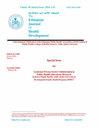西方医学教育模式:在自主条件下的应用经验
IF 0.5
4区 医学
Q4 PUBLIC, ENVIRONMENTAL & OCCUPATIONAL HEALTH
Ethiopian Journal of Health Development
Pub Date : 2021-01-01
DOI:10.32921/2225-9929-2021-3-43-63-67
引用次数: 0
摘要
在与立陶宛卫生科学大学合作的框架内,以S.Zh命名的哈萨克斯坦国立医科大学。阿斯芬季亚罗夫改革了大学行政管理,引入了数字文件管理“天狼星”,允许行政和法规文件,通信,订单执行,订单数字化,从而节省了成本,降低了人工成本;一些科学过程已经转移到数字化和自动化模式。许多基础的非医学教育项目也转移到远程学习模式。在校学生、本科生、博士生参与研究过程;学生科学活动的基础是与导师一起参与校内竞赛,这是最有希望实施科学研究的方式。为了提高教育活动的质量,根据国际高等教育和研究生教育标准,建立了有效的内部质量保证体系。学习过程以高标准的学术诚信为基础,得到了学生、教师和大学行政管理人员的积极支持本文章由计算机程序翻译,如有差异,请以英文原文为准。
Western Model of Medical Education: Experience of Application in the Conditions of Autonomy
Within the framework of cooperation with Lithuanian University of Health Sciences, Kazakh National Medical University named after S.Zh. Asfendiyarov reformed the management of the university administration with the introduction of digital document management "Sirius", which allowed administrative and regulatory documents, correspondence, execution of orders, orders to be digitalized, leading to cost savings and reduction of labor costs; some scientific processes have been transferred to the digitalization and automation mode. Many basic non-medical educational programs are also transferred to the distance learning mode. Resident students, undergraduates, doctoral students are involved in the processes of research; the basis of the scientific activities of students is laid participation together with the supervisor in the intramural competitions, as the most promising for the implementation of scientific research.To improve the quality of educational activities, an effective system of internal quality assurance was created, based on international standards of higher and postgraduate education. The learning process is based on high standards of academic integrity, which are actively supported by the students, teachers and administrative and managerial staff of the universities
求助全文
通过发布文献求助,成功后即可免费获取论文全文。
去求助
来源期刊

Ethiopian Journal of Health Development
PUBLIC, ENVIRONMENTAL & OCCUPATIONAL HEALTH-
CiteScore
0.80
自引率
0.00%
发文量
0
审稿时长
>12 weeks
期刊介绍:
The Ethiopian Journal of Health Development is a multi and interdisciplinary platform that provides space for public health experts in academics, policy and programs to share empirical evidence to contribute to health development agenda.
We publish original research articles, reviews, brief communications and commentaries on public health issues, to inform current research, policy and practice in all areas of common interest to the scholars in the field of public health, social sciences and humanities, health practitioners and policy makers. The journal publishes material relevant to any aspect of public health from a wide range of fields: epidemiology, environmental health, health economics, reproductive health, behavioral sciences, nutrition, psychiatry, social pharmacy, medical anthropology, medical sociology, clinical psychology and wide arrays of social sciences and humanities.
The journal publishes the following types of contribution:
1) Peer-reviewed original research articles and critical or analytical reviews in any area of social public health. These papers may be up to 3,500 words excluding abstract, tables, and references. Papers below this limit are preferred.
2) Peer-reviewed short reports of research findings on topical issues or published articles of between 2000 and 4000 words.
3) Brief communications, and commentaries debating on particular areas of focus, and published alongside, selected articles.
4) Special Issues bringing together collections of papers on a particular theme, and usually guest edited.
5) Editorial that flags critical issues of public health debate for policy, program and scientific consumption or further debate
 求助内容:
求助内容: 应助结果提醒方式:
应助结果提醒方式:


